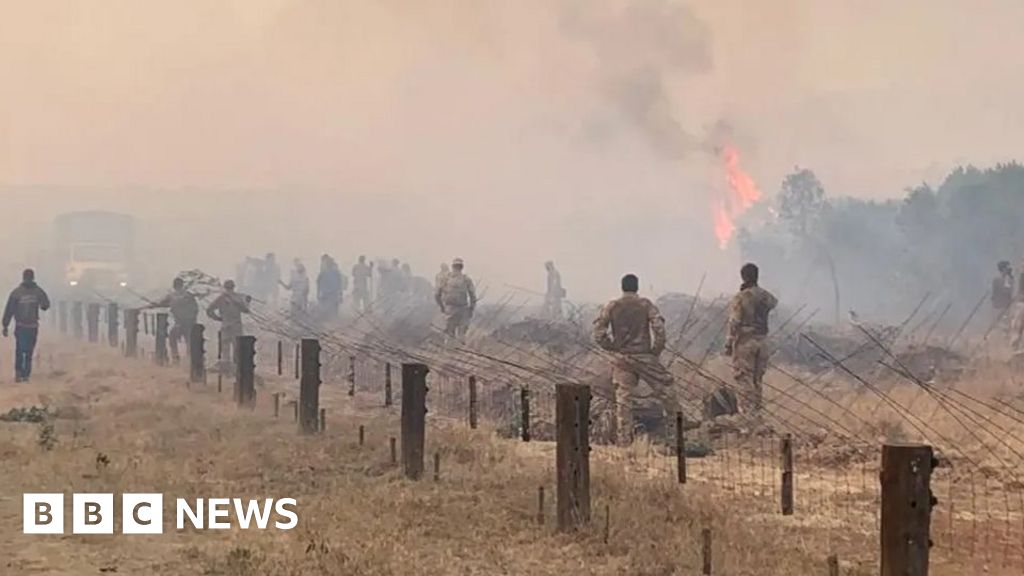UK agrees to pay Kenyans affected by military fire

```html UK Pays Compensation to Kenyans Affected by Military Fire
The UK government has reached an out-of-court settlement, agreeing to pay compensation to thousands of Kenyans impacted by a wildfire sparked during a British military training exercise in 2021. The fire, which ravaged the Lolldaiga conservancy in Kenya's Rift Valley, led to claims of property loss and health complications from 7,723 Kenyan residents.
Compensation Details and Legal Battle
While the British government has not disclosed the exact amount of the settlement, the lawyer representing the claimants, Kevin Kubai, told the BBC it totalled £2.9 million. The settlement brings an end to a protracted legal battle that has spanned four years.
Mr. Kubai acknowledged that the compensation amounts were perceived as insufficient by some clients, but emphasized that pursuing further litigation would have been a lengthy and complex process. He highlighted the challenges in proving individual cases due to the loss of evidence over time and the lack of comprehensive medical records to support claims of health damage from smoke inhalation.
British High Commission's Response
A spokesperson for the British High Commission in Nairobi described the fire as "extremely regrettable" and stated that the UK had dedicated "considerable time, effort and resource" to resolving the claims. The UK Ministry of Defence previously stated in 2022 that the fire was likely caused by a camp stove being knocked over during the training exercise.
Impact of the Fire and Environmental Damage
The fire destroyed approximately 7,000 acres (2,800 hectares) of private land within the Lolldaiga conservancy. Claimants argued that the fire caused environmental damage to surrounding communities due to smoke inhalation and property damage resulting from stampeding wild animals. The British government has since contributed to the conservancy's restoration efforts, and military exercises continue to take place in the area.
Historical Context and Land Disputes
The Lolldaiga conservancy, situated on the Laikipia plateau, is located in a region historically marked by land disputes stemming from British colonial-era land seizures. This historical context adds a layer of complexity to the present-day situation, highlighting the enduring impact of colonialism on land ownership and resource management in Kenya.
BATUK and its Economic Contribution
The British Army Training Unit Kenya (BATUK), based at the nearby Nyati Barracks, plays a significant role in the region. BATUK contributes tens of millions of pounds to the Kenyan economy annually, hosting thousands of British troops for training exercises in locations like Lolldaiga. The facility, recently refurbished at a cost of £70 million, provides ideal conditions for harsh environment training.
Controversies Surrounding BATUK
Despite its economic contributions, BATUK has faced scrutiny over the years due to controversies surrounding the behavior of some soldiers. These controversies include allegations of fatal hit-and-run incidents, murder, and sexual exploitation of Kenyan women. These allegations have strained relations between the UK and Kenya and prompted calls for greater accountability.
Expert Perspective: Impact on UK-Kenya Relations
Dr. Maria Nzuki, a political analyst specializing in UK-Kenya relations at the University of Nairobi, argues that while the compensation is a positive step, it is crucial for the UK to address the underlying issues of accountability and transparency surrounding BATUK's operations. "The payment of compensation is important, but it does not erase the need for justice and preventative measures," she states. "The UK needs to demonstrate a genuine commitment to ensuring the safety and well-being of Kenyan communities affected by its military activities."
Expert Perspective: Environmental Considerations
Environmental scientist, Professor James Okello, from the Laikipia Research Programme, highlights the long-term ecological consequences of such fires. "The immediate damage is obvious, but the long-term effects on biodiversity, soil health, and water resources can be significant," he explains. "Restoration efforts must be comprehensive and consider the complex interplay of factors that contribute to the health of the ecosystem."
Looking Ahead
The settlement marks a significant step towards addressing the grievances of the Kenyan community affected by the 2021 fire. However, the incident underscores the need for continued dialogue and collaboration between the UK and Kenya to ensure responsible military training practices and to address the historical and ongoing challenges related to land ownership and environmental protection in the region. ```
Originally sourced from: BBC News Africa
